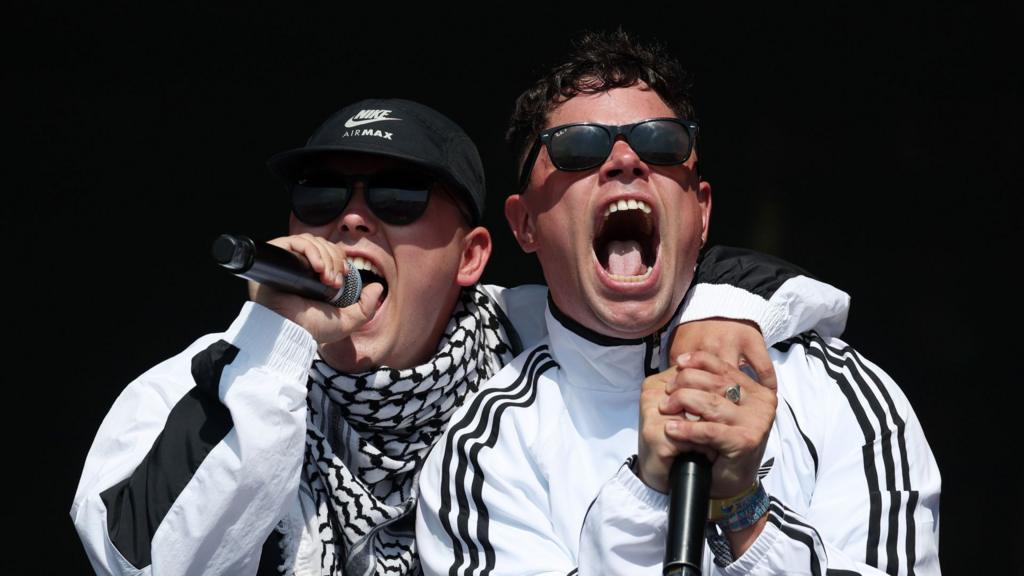Last year, the BBC was awarded a BAFTA for its Glastonbury coverage. This year, it faces criticism, specifically regarding one, or potentially two, hours of programming, encompassing Kneecap’s set following Bob Vylan’s performance on the West Holts stage Saturday afternoon.
I arrived early to cover the Belfast rap trio’s performance, aware of the Prime Minister’s previous objections, the festival organisers’ resistance to political pressure, a band member’s ongoing bail on a denied terror charge, and the BBC’s pre-emptive decision against a live stream.
Frankly, I was unfamiliar with Bob Vylan, as likely were many among the millions who tuned into the BBC’s Glastonbury coverage. The live streamers of the Bob Vylan set likely constituted a small proportion of the total audience.
However, the punk duo has since gained significant notoriety.
Standing in the crowd, the lead singer’s comments advocating violence and leading chants of “death, death to the IDF [Israel Defense Forces]” made it clear that, as the festival organisers later acknowledged, a line had been crossed.
This deviated from Glastonbury’s espoused ethos of peace and inclusivity.
Police have initiated a criminal investigation into Bob Vylan’s set, examining whether onstage statements violated the law.
Some attendees joined in chanting “death to the IDF,” seemingly in agreement. Bob Vylan also used the controversial slogan “From the river to the sea.”
The chant is interpreted by some as a call for Palestinian control of the entire region between the Jordan River and the Mediterranean Sea, including Israel. Critics argue that the slogan advocates for the destruction of the state of Israel.
Conversely, pro-Palestinian activists contend that the majority using the chant seek an end to Israel’s occupation of the West Bank and blockade of Gaza, not the dismantling of Israel itself.
From my perspective at the time, the slogan did not elicit a significant reaction from the crowd.
The focus has been on the band, the festival organisers, and the BBC. However, the extent of freedom of expression for the thousands present on Saturday afternoon also merits consideration.
Following Kneecap’s performance, I spoke with fans who supported the band’s stance on the Israel-Gaza war and welcomed their message to the British government.
I also spoke with Jewish festival-goers who stated they felt compelled to conceal their identities at Glastonbury this year due to anticipated reactions. One remarked that despite the festival’s generally optimistic and inclusive atmosphere, “there’s a difference if you’re a Jew.”
Both viewpoints warrant attention.
It appeared that the BBC’s extensive preparation for Kneecap’s performance may have overshadowed Bob Vylan’s potential for controversy. Over-focusing on one potential issue can lead to another emerging unexpectedly.
Anticipating the precise content of Bob Vylan’s performance was impossible. Questions remain about the pre-event due diligence, which I am informed was conducted. However, the BBC’s perceived sluggish response as the set unfolded is a more significant concern.
Having covered numerous BBC “scandals” as a media editor at BBC News, I acknowledge that stories concerning the BBC are frequently weaponized by other media outlets. Furthermore, corporate interests may motivate some to advocate for a weaker BBC for their own gain.
The BBC has expressed regret for not halting the live stream during the performance. While the controversial comments occurred towards the end of the set, intervention remained possible. A swift decision would have been necessary, and if editorial guidance was required, the performance may have concluded before action could be taken. The set was subsequently removed from iPlayer.
The BBC is reviewing its live event guidelines to ensure “teams are clear on when it’s acceptable to keep output on air.”
Freedom of speech, freedom of expression, and artistic license were undoubtedly considerations for the BBC leading up to the festival.
The prevalence of Palestinian flags at the performance underscores widespread solidarity with the Palestinian people, and for some, the accusation of genocide against Israel (which Israel denies). The BBC would want to avoid the appearance of censorship.
However, incitement to violence is not an opinion, and can constitute a criminal offense.
Culture often reflects politics, and the events at Glastonbury mirror the broader, heated debate across the country regarding the situation in Gaza.
The Bob Vylan set has legitimately raised questions for the BBC, Glastonbury organisers, and the performers themselves, who made the initial comments. However, as a publicly-funded organisation, the BBC rightly faces scrutiny.
These events have compounded existing challenges for the corporation, whose coverage of Israel and Gaza has already faced criticism.
An investigation is underway regarding a previously broadcast documentary about children in Gaza. A separate documentary about doctors in Gaza was withdrawn by the BBC and will now air on Channel 4.
Will the Principality Stadium roof be open and which roads will be closed? Your questions answered.
A £30,000 grant sees the Godiva Festival stage back at Coventry’s War Memorial Park, this weekend.
The band made headlines at Worthy Farm over the weekend with a chant about the IDF.
The party events led by cycling DJ Dom Whiting attracted 2,000 drum and bass fans.
It comes after Ofcom said it had asked the BBC why controversial remarks made by the band were broadcast live.

